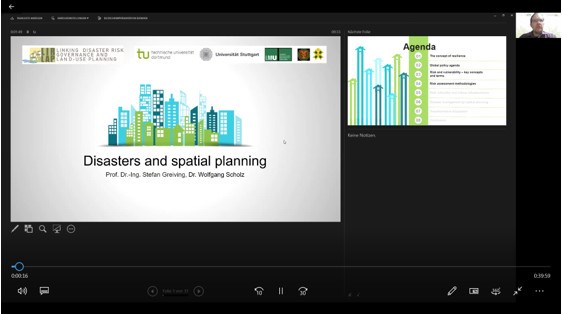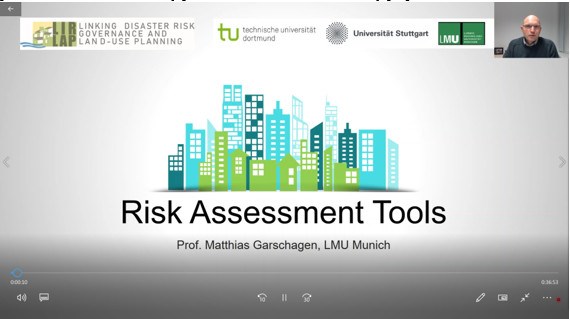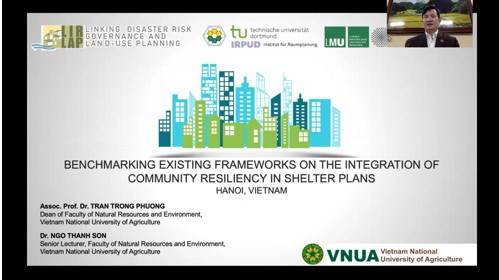LIRLAP PROJECT: I-CORE TRAINING
Cập nhật lúc 10:24, Thứ sáu, 04/03/2022 (GMT+7)
Under the regular activities of the Linking Disaster Risk Governance and Land-Use Planning (LIRLAP) project, the Institute of Spatial Planning of the Technical University of Dortmund (IRPUD - TU Dortmund), in partnership with the Planning and Development Research Foundation (PLANADES) hold the first Online International Training Course on the Integration of Community Resilience in Urban Shelter Planning and Management (I-CORE Training).
February, 2022
Under the regular activities of the Linking Disaster Risk Governance and Land-Use Planning (LIRLAP) project, the Institute of Spatial Planning of the Technical University of Dortmund (IRPUD - TU Dortmund), in partnership with the Planning and Development Research Foundation (PLANADES) hold the first Online International Training Course on the Integration of Community Resilience in Urban Shelter Planning and Management (I-CORE Training). Vietnam National University of Agriculture (VNUA) is actively joined and contributed to the training course. It was noted that there were 46 participants from Government agencies and Non-Government organizations (Philippines), Educational Institutions (Thammasat University, Thailand and Vietnam National University of Agriculture, Vietnam) participated in I-CORE training during January 17-February 28, 2022. Assoc. From VNUA, Prof. Dr. Tran Trong Phuong from the Faculty of Natural Resources and Environment (FONRE) delivered an interesting lecture on Good Practices in Integrating Community Resiliency in Shelter Plans.
    |
 |
| Screenshot of participants in I-CORE training |
The training course aims to gather planning professionals and organizations and introduce them to the following: a) concepts and principles of community resiliency; b) relationship between community resiliency and shelter planning; c) good practices in integrating community resiliency in shelter plans in selected case countries; and d) illustrate the process of formulating a resilient urban shelter plan. The four (4) training modules will be delivered for six (6) weeks given a total of 30 hours.
Module 1: Introduction to Community Resiliency
The module aims to introduce the key concepts, principles, and approaches of community resilience. The coverage is targeted, but not limited, to comprehending the underlying principles of what constitutes a cohesive and resilient community and developing effective measures of resilience and resilient practice. The inclusion of disaster risk reduction and management (DRRM) intends to look critically at planning processes, not only from the perspective of reducing vulnerability but also to minimize potential effects from its implementation.
    |
 |
| Prof. Stefan Greiving introduced Disasters and spatial planning |
Module 2: Community Resiliency and its Relationship with Shelter Planning.
The objective of this module is to link the foundations of community resilience with urban shelter planning. It also intends to characterize the global trends on community-level resilience and urban shelter planning in terms of risk assessment and management, gender sensitivities, cultural diversities as well as community participation, and capacity building. The module also aims to provide the learners with the basics of developing a pandemic resilient community plan which focuses on community preparedness.
    |
 |
| Prof. Maththias Garschagen introduced risk assessment tools |
Module 3: Good Practices in Integrating Community Resiliency in Shelter Plans.
This module intends to compare variations or similarities in terms of the existing shelter planning frameworks and analyze their implementation at the local levels in selected case countries. It also aims to present good practices in integrating community resiliency in urban shelter planning and management.
    |
 |
| Speakers and participants of FONRE in the I-CORE training course |
    |
 |
| Assoc. Prof. Dr. Tran Trong Phuong, Dean of FONRE (VNUA) gave a lecture on Benchmarking existing framework on the integration of community resilience in shelter plans (Module 3) |
Module 4: Development of a Resilient Urban Shelter Plan and Establishment of Community-Based Management Schemes.
This final module is designed to assess the learnings from Modules 1 to 3 through small group discussions and workshops. The objective is to capacitate participants in the development of a resilient urban shelter plan. The module also aims to impart the mechanisms of operationalizing community resilience action plans. The final part of our I-CORE Training Course. The participants will be presenting the output of their exercises/discussion sessions from Module 04-Workshop. In the end, a major output of I-CORE is developing key concepts and terminologies, principles, approaches of community resiliency as well as the dimensions and needs of resilient buildings and infrastructure. The action plan will enable the participants to apply the learnings and skills gained from the training to address specific and practical problems related to their field of interest or specialization, for which they will receive constructive and academic feedback.
Faculty of Natural Resources and Environment